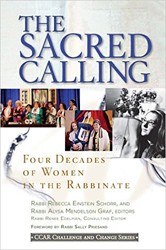William F.S. Miles has written in the past about “exotic peoples around the world.” In Zion in the Desert, this political anthropologist turns to a culture closer to home: “my own strange tribe: the Jews.” In this book Miles offers a glimpse into his six weeks on Yahel, the first Reform kibbutz.
Miles deftly weaves three narrative threads: the history of kibbutzim and the Reform movement set against the backdrop of Israel’s political history; the sentiments among American Jewish baby boomers about a soul-less, materialistic and ‘Jewishless’ existence which draws them to the desert; and Miles’ own quest to answer the question “Who would I be now if I had indeed made aliya?”
Miles searches for answers by interviewing those who did make aliya, and through these interviews he invites the reader on a journey which might allow her to answer the same questions for herself.
Yahel began in the late ‘70s with “a few radical rabbis and Israel immigration activists.” A founding member captures the sentiments of the early days in a passage that exemplifies the infectious passion pulsing through the book: “Perhaps it was the brashness of youth and the lingering madness which had led us from the comforts of ‘normal’ existence to this stark and lifeless desert. But we laughed at the challenge and called our laughter idealism.”
Miles brings us deep into the richness of Yahel’s natural environment with descriptions of the desert’s beauty as well as its harshness, and with descriptions of life on Yahel, which is similarly beautiful and harsh. The residents sometimes struggle with the tension between group and individual living, public and private life. There are affairs, jealousies, mid-life crises, premature death, gender inequities, struggles to keep up with the Joneses, child rearing issues. Human frailty treads firmly amid the idealism that built the kibbutz. But that frailty is countered by the strength and support of community, and it’s that sense of community that many kibbutzniks seem to have sought and found at Yahel.
This book offers a uniquely beautiful glimpse into kibbutz life, told from the perspective of those who live that life as well as that of an author who wonders — what if he had?
Ada Brunstein is the Head of Reference at a university press.




